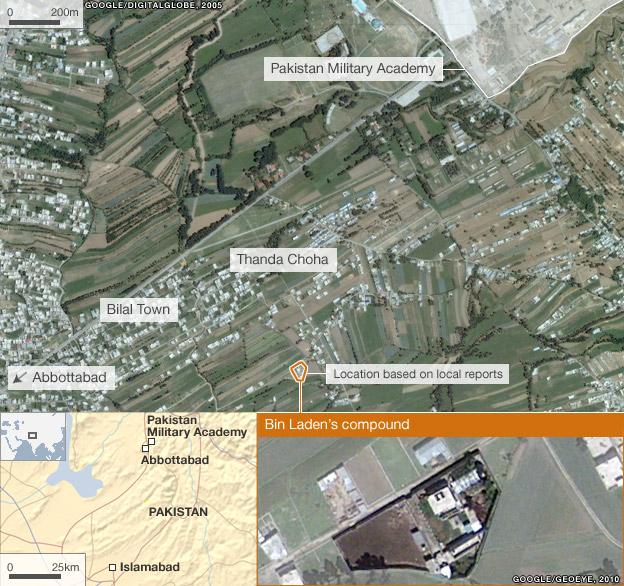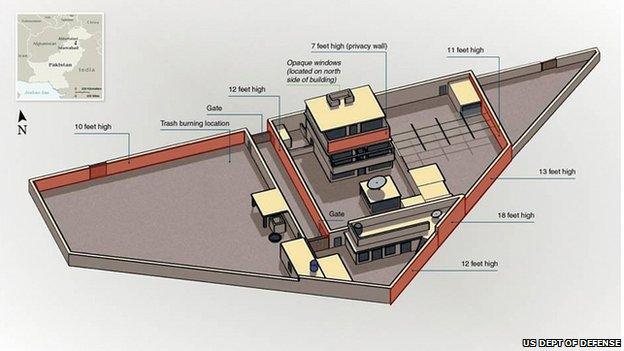Obama presses Pakistan over Bin Laden's support network
- Published
US President Obama has urged Pakistan to investigate how Osama Bin Laden was able to live and operate from the country without their knowledge.
US President Barack Obama has called on Pakistan to investigate the network that sustained Osama Bin Laden in his hideout where he was killed last week.
Mr Obama told CBS show 60 Minutes the government in Islamabad had to find out if any of its officials knew of the al-Qaeda leader's whereabouts.
An Obama administration official said the US wanted to speak to Bin Laden's widows, who are in Pakistani custody.
Pakistan has denied knowing Bin Laden was holed up in Abbottabad.
In an interview broadcast on Sunday, President Obama told CBS the al-Qaeda leader must have had "some sort of support network" in Pakistan, but he did not know whether it included government officials.
"We don't know whether there might have been some people inside of [Pakistan's] government, people outside of government, and that's something that we have to investigate and, more importantly, the Pakistani government has to investigate," the US president said in the interview, which was conducted on Wednesday.
'Library' of intelligence
US National Security Adviser Tom Donilon meanwhile told NBC talk show Meet the Press that Islamabad needed to establish how Bin Laden lived for six years a short drive from the capital and beside a military academy.
With Bin Laden dead, there has been speculation about whether his deputy, Ayman al-Zawahiri, will take over as al-Qaeda leader.
But Mr Donilon said the Egyptian "is not anywhere near the leader that Osama Bin Laden was".
He also said the Pakistani authorities needed to provide the US with access to Bin Laden's three widows, who were taken into custody after last week's US commando raid.
American officials have meanwhile been poring over computer files seized by US special forces from the hideout.
"It's [the intelligence cache] about the size, the CIA tells us, of a small college library," said Mr Donilon.
On Saturday, the Pentagon released from the material five home videos featuring Bin Laden, with the audio removed.
They included a message by the al-Qaeda leader to the US and footage of Bin Laden watching an item about himself on TV.
'Ridiculous'
US officials said the Abbottabad compound was a command and control centre from where Bin Laden had actively led al-Qaeda.
But an unidentified senior Pakistani intelligence official told Reuters news agency on Sunday: "It sounds ridiculous. It doesn't sound like he was running a terror network."
Many in Abbottabad say they do not believe the videos are real
There have been suspicions that someone in Pakistan's Inter-Services Intelligence (ISI) spy agency, which has a long history of contacts with militant groups, may have known where Bin Laden was hiding.
But Pakistan has dismissed such suggestions. Prime Minister Yousuf Raza Gilani is to make a statement to parliament about raid later on Monday.
Former US Vice-President Dick Cheney waded into the debate on Sunday, saying the US was "headed for trouble down the road" if it turned its back on the region.
In an interview with Fox News, Mr Cheney said: "I think we need to maintain relationships, working relationships, with Pakistan, Afghanistan and the rest of them. I don't think we need to run for the exits."
Meanwhile, a senior United Nations official called on the White House to disclose what orders were given to the US Navy Seals who went into the al-Qaeda chief's compound.
UN special rapporteur on extrajudicial executions Christof Heyns told the BBC the killing could set a precedent for any country to cross borders and pursue enemies "where there is in practical terms no option to capture".
"And are we not then on a slippery slope to say that the whole world is a battlefield?" he said, on The World This Weekend programme.

